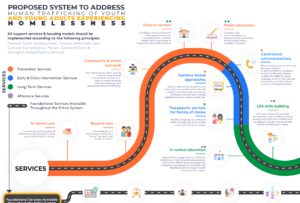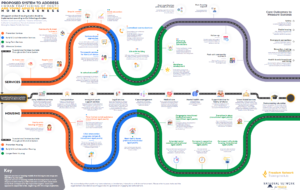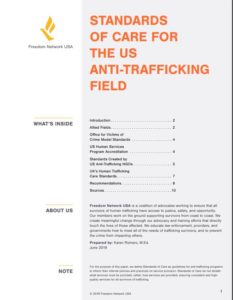The Resource Library includes fact sheets, promising practices, tools, templates, and training materials developed by subject-matter experts with direct experience working with survivors. Resource topics address current trends and challenges in the field.
Search Results 7 matching results for "Safety Planning"
Re-Centering Sex Worker Safety in Anti-Trafficking Work: Perspectives from the Field.
Freedom Network USA (FNUSA) and the National Survivor Network (NSN) have developed the following guidelines to help anti-trafficking organizations work more collaboratively with sex worker safety advocates, some of whom experienced human trafficking, and to reduce harm that anti-trafficking efforts cause to those in the sex trades.
Levels: Advanced Intermediate Introductory
Material Types: Promising Practices Reports Tools
Types of Trafficking: Labor Trafficking Sex Trafficking
Keywords: Awareness Case Management Foreign Nationals Legal Services Policy Program Management Promising Practices Public Health Safety Planning Sex Work Trauma Informed
Demographics: Adults Foreign National LGBTQIA+ Men and Boys US Citizen/Legal Permanent Resident
The Intersection of Substance Use and Housing
This fact sheet provides an in-depth overview of the intersection of substance use and housing. It details how providers can support survivors who may be actively using substances through trauma-informed and voluntary services. The fact sheet also provides tips for supporting survivor well-being and recovery.
Levels: Intermediate
Material Types: Fact Sheets
Types of Trafficking: Labor Trafficking Sex Trafficking
Keywords: Housing Promising Practices Safety Planning Trauma Informed
Demographics: Adults
Youth Systems Infographic – Printable 2 Page Version
This 2 page, printable infographic provides a visual representation of the pathways of services and housing options that youth survivors of human trafficking may have access to. This resource is intended for service and housing providers who work with youth and youth survivors of trafficking.
Levels: Intermediate Introductory
Material Types: Tools
Types of Trafficking: Labor Trafficking Sex Trafficking
Keywords: Awareness Case Management Housing Legal Services Program Management Promising Practices Referral Safety Planning Standards of Care Trauma Informed
Demographics: Youth
Youth Systems Infographic
This infographic provides a visual representation of the pathways of services and housing options that youth survivors of human trafficking may have access to. This resource is intended for service and housing providers who work with youth and youth survivors of trafficking.
Levels: Intermediate Introductory
Material Types: Tools
Types of Trafficking: Labor Trafficking Sex Trafficking
Keywords: Housing Legal Services Program Management Referral Safety Planning Standards of Care Trauma Informed
Demographics: Youth
Addressing the Intersection of Substance Use and Housing
The webinar provided attendees with an understanding of how substance use intersects with human trafficking and shared practical examples of best practices to house survivors who may be actively using.
Levels: Introductory
Material Types: Webinars & Videos
Types of Trafficking: Labor Trafficking Sex Trafficking
Keywords: Housing Safety Planning Trauma Informed
Demographics: Adults
Standards of Care for the U.S. Anti-Trafficking Field
This white paper explores establishing Standards of Care for the anti-trafficking field in the United States. The author discusses the need to establish basic guidelines to ensure consistent service provision regardless of the geographic area in which services are accessed.
Levels: Introductory
Material Types: Promising Practices Reports
Types of Trafficking: Labor Trafficking Sex Trafficking
Keywords: Case Management Promising Practices Referral Safety Planning Standards of Care Trauma Informed
Intake and Safety Planning Process
This second training of the practical 4-part training and technical assistance series on trauma-informed care for case managers and social workers working with trafficking survivors focuses on creating a trauma-informed intake and safety planning process. This series is funded and supported by OVCTTAC.








